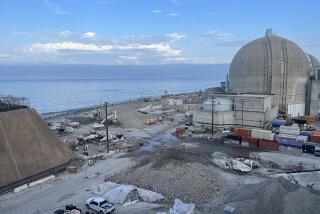Physicists Seek to Salvage Science From Collider : Program: U.S. role in European project may keep momentum in the quest to discover the origins of matter.
- Share via
WASHINGTON — Disappointed American physicists are anxiously searching for a way to salvage some science from the ill-fated superconducting super collider.
The $11-billion super collider has been the highest priority of the U.S. high-energy physics program for the past decade--the next leap in the human quest to discover the origins of matter.
With no white knight on the horizon, “big science” may have to go international. No single nation, it seems, can afford it.
“We have to keep the momentum and optimism, and start thinking about international collaboration,” says Leon M. Lederman, the Nobel Prize-winning physicist who was the architect of the super-collider plan. He called it “the machine in the desert.”
But some physicists fear that the fatal blow dealt the U.S. collider may discourage needed global financial partnerships.
Had Congress not pushed the project toward oblivion, the collider would have been the world’s most powerful atom smasher.
Its 54-mile main tunnel, encircling the Texas prairie town of Waxahachie, would have been lined with 10,000 superconducting magnets. They would have guided two beams of protons no wider than a strand of human hair toward head-on crashes at nearly the speed of light, producing 100 million collisions a second.
The energy would have recreated conditions that may have existed at virtually the moment of birth of the universe--the moment of the “big bang.”
But in October, responding to strong political pressure for federal budget-deficit reduction, Congress killed the collider.
“I don’t argue that the super collider represents good science,” says Rep. Sherwood Boehlert (R-N.Y.), a leading opponent of the project. But “at a time when our deficit is soaring through the roof,” he says, the collider was far over budget and behind schedule.
“The big question now is whether this is a trend or a terribly unfortunate incident, whether all research is under threat or just subject to congressional mood swings,” says Lederman, professor of science at the Illinois Institute of Technology. His book “The God Particle” explains the ancient search for the building block of all matter.
*
Energy Secretary Hazel O’Leary calls the collider’s death “a devastating blow” to basic research and its technological and economic spinoffs. The super collider, she says, was expected to be “the flagship for the world’s high-energy physics program.”
About 20% complete, the super collider is the biggest project the Energy Department has ever tried to build. A spokesman says a detailed plan on how to profit most from the dismantling of the collider’s human and tangible assets will be submitted to Congress by next July.
Nearly $2 billion already has been spent on the collider. More than 2,000 of an anticipated 7,000 people were on the payroll; 14.7 miles of the main tunnel were dug and construction of some major facilities was completed. The complicated shutdown process is expected to cost more than $1 billion.
“It would be tragic if what we have done so far were wasted,” Lederman says.
The European Laboratory for Particle Physics (known by its French acronym, CERN) is designing a large hadron collider that would be similar to the super collider, but about one-third as powerful.
Not yet approved or funded, it would use an existing 17-mile circular accelerator tunnel that crisscrosses the French-Swiss border. A decision by the CERN consortium of 14 countries is expected in the spring of 1994.
“We have to find out what’s the price of admission for the United States to participate,” Lederman says.
The CERN collider would be “a big jump over Fermilab,” the world’s highest energy-producing accelerator, but Lederman tells National Geographic, “It would not be enough to address what the super collider would have done.” Fermilab, outside Chicago, is only 5% as powerful as the super collider would have been.
“Ten years down the road--without the super collider or the CERN collider--research at the frontiers of science will come to an end,” says another Nobel Prize-winning physicist, Steven Weinberg of the University of Texas, whose 1992 book, “Dreams of a Final Theory,” is a plea for the super collider.
“With the super collider dead, scientifically it is more important than ever to build the CERN collider,” Weinberg says. “But politically it is now more difficult than ever. If Congress wouldn’t spend billions to build a collider in Texas, it will be hard to get them to spend hundreds of millions to support one in Switzerland.”
*
In lieu of cash contributions, Weinberg suggests, U.S. industry could manufacture and supply the superconducting magnets, a collider’s most expensive, most critical component.
Besides potential spinoffs from the super collider for advances in medicine, computer science and superconductivity in transportation, he says, “there is a whole new world of phenomena to discover that might be useful in ways we haven’t anticipated. The super collider would have studied at the deepest level ever why the universe is the way it is.”
The super collider’s demise is “a national tragedy,” says Stanley G. Wojcicki of Stanford University, chairman of the Energy Department’s high-energy physics advisory panel. “Without the SSC, how will the United States maintain a significant presence at the frontier of science?
“We should collaborate with the Europeans, but we canceled our project. How are we to be seen as reliable partners?
“Now we are going to spend money filling up holes in Texas rather than doing something productive. And you can’t put a dollar value on the human aspect.” About 200 families were forced off their property to clear a site for the super collider.
In Washington, the National Assn. for the Superconducting Super Collider, which lobbied for the industries that would have built the massive project, is closing its doors after 18 months.






